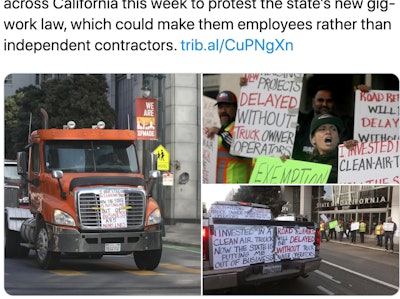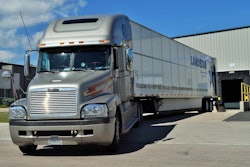
Truckers gathered outside government office buildings across California this week to protest the state’s new gig-work law, which could make them employees rather than independent contractors. https://t.co/RK5aBB0Qjj pic.twitter.com/ZgdWPCZwHF
— San Francisco Chronicle (@sfchronicle) November 6, 2019
Following rumblings of a planned protest in recent weeks, owner-operator truckers took to the streets in various cities across California this week to air their grievances against the state’s new, restrictive labor law that could block owner-operators from contracting with carriers in the state. The protests come as ride-sharing platforms Uber and Lyft prepare to fight the state for an exemption to the law by beefing up their pay and benefits to their passenger car drivers.
A.B. 5, just signed by Gov. Gavin Newsom last month, takes effect in little less than two months, on Jan. 1.
The law is expansive, touching a wide and diverse set of industries in the state, from healthcare and technology to construction and trucking, among others. As reported in various forms by Overdrive in recent months, it leaves owner-operators and fleets in unprecedented territory, in which they must weigh the available options to continue operating in the state and choose a path forward. For some, that may mean refusing to work in California. For others it could mean transitioning their business to a new model or potentially ending their single-truck operation and transitioning into a company driver role.
For companies like Uber and Lyft, it means drivers can no longer be classified as independent contractors and must be treated as employees. Thus, they’d be entitled to more benefits from their employers and would be more apt to unionize.
Multiple local news outlets reported this week that owner-operator truckers from varied segments picketed outside of government offices in San Francisco, Oakland, San Jose, Monterrey and other areas within central to northern California. They pumped signs that voiced their opposition to A.B. 5 and told reporters the effects the law could have, including, in some cases, closure of their small operations. Protests mostly took place Nov. 4, as called for by flyers posted in various truck-centric areas in the state, though protests were ongoing throughout the week.
The owner-operator protesters hoped to press the state’s lawmakers to provide the trucking industry an exception to allow motor carriers to continue to contract with owner-operators. Trucking trade groups, such as the California Trucking Association and the Western States Trucking Association, are pushing for the same.
Likewise, Uber and Lyft, among others, have joined in a coalition to try to fend off compliance with California’s law against using independent contractors. The companies say they’ll agree to meet certain conditions should the state award them a way out of A.B. 5.
While their push doesn’t impact truck fleets or owner-operators, its groundwork could provide some leverage for trucking to make a case for an exemption.
Certain benefits Uber, Lyft and cohorts agree to meet are very much similar to those that carriers already offer to owner-operators, such as paying above minimum wage, aiding in fuel and maintenance costs (some owner-ops have access to fleet accounts where purchases come at a discount), and others that most don’t, such as providing some health care benefits.
What’s more, the coalition of transportation tech companies also say they’d implement new mandatory training standards, stiffer background checks and zero-tolerance drug and alcohol policies — all conditions that are obviously already baked in to the trucking industry.
If successful, the model could provide trucking interests with a compelling case for requesting any exemptions awarded to the Uber and Lyft coalition, says attorney Greg Feary, partner at the nationwide transportation law firm Scopelitis, Garvin, Light, Hanson and Feary.
“That is a strategy you’ll probably see,” he says, the argument being “if it’s good for this segment, why wouldn’t it be good for heavy trucking?”
Legislation for the Uber and Lyft coalition’s exemption is already in the works, slated to be taken up when California legislators return to Sacramento for their 2020 session.
The companies “have already signaled an urgency within their segment of transportation,” says Feary.
The focus lawmakers have directed toward the tech transportation sector will likely turn to the traditional trucking sector as the threat to the movement of goods becomes even more apparent.
“What does it mean around Christmas time?” Feary asks. “What does it mean for agricultural products that come out of California and on to tables across the country? That’s what these protests and picketing” are aimed toward, “orchestrated to identify the fact that a lot of people will be impacted by [A.B. 5’s effects], including the voters in California.”











